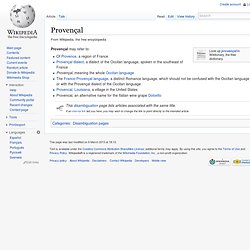

Oc Language History Provence, - by Provence Beyond. Stroll: | History Index | Medieval | Oc Language | Pierre le berger |
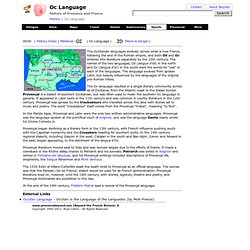
Old Frankish. Frankish or Old Franconian (or, less correctly, Old Frankish) was the language spoken by the Germanic Franks in the Low Countries and adjacent parts of contemporary France and Germany between the 4th and 8th century.
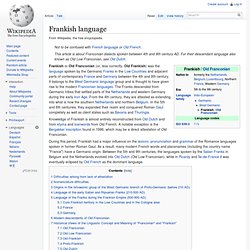
It belongs to the West Germanic language group and is thought to have given rise to the modern Franconian languages. The Franks descended from Germanic tribes that settled parts of the Netherlands and western Germany during the early Iron Age. From the 4th century, they are attested as extending into what is now the southern Netherlands and northern Belgium. In the 5th and 6th centuries, they expanded their realm and conquered Roman Gaul completely as well as client states such as Bavaria and Thuringia. Knowledge of Frankish is almost entirely reconstructed from Old Dutch and from etyma and loanwords from Old French. During this period, Frankish had a major influence on the lexicon, pronunciation and grammar of the Romance languages spoken in former Roman Gaul. French language. French (le français [lə fʁ̥ɒ̃sɛ] ( ) or la langue française [la lɑ̃ɡ fʁɑ̃sɛz]) is a Romance language spoken as a first language in France, the Romandy region in Switzerland, Wallonia and Brussels in Belgium, Monaco, the provinces of Quebec, Ontario and New Brunswick (Acadia region) in Canada also in Haiti, the Acadiana region of the U.S. state of Louisiana, the northern parts of the U.S. states of Maine, New Hampshire and Vermont in the New England region, and by various communities elsewhere.
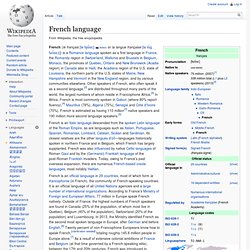
Other speakers of French, who often speak it as a second language,[3] are distributed throughout many parts of the world, the largest numbers of whom reside in Francophone Africa.[4] In Africa, French is most commonly spoken in Gabon (where 80% report fluency),[4] Mauritius (78%), Algeria (75%), Senegal and Côte d'Ivoire (70%). French is estimated as having 110 million[3] native speakers and 190 million more second language speakers.[5] Geographic distribution[edit] Europe[edit] Langues d'oïl. The langues d'oïl [lɑ̃ɡᵊdɔjl][2] or langues d'oui [lɑ̃ɡᵊdwi], in English the Oïl /ˈwiːl/ or Oui /ˈwiː/ languages, are a dialect continuum that includes standard French and its closest autochthonous relatives spoken today in the northern half of France, southern Belgium, and the Channel Islands.
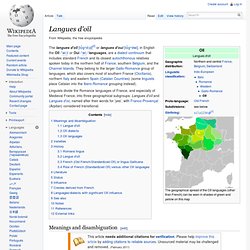
They belong to the larger Gallo-Romance group of languages, which also covers most of southern France (Occitania), northern Italy and eastern Spain (Catalan Countries) (some linguists place Catalan into the Ibero-Romance grouping instead). Linguists divide the Romance languages of France, and especially of Medieval France, into three geographical subgroups: Langues d'oïl and Langues d'oc, named after their words for 'yes', with Franco-Provençal (Arpitan) considered transitional.
Meanings and disambiguation[edit] Langue d'oïl (in the singular), Oïl dialects and Oïl languages (in the plural) designate the ancient northern Gallo-Romance languages as well as their modern-day descendants. History[edit] Old French. Old French (franceis, françois, romanz; Modern French ancien français) was the Gallo-Romance dialect continuum spoken from the 9th century to the 14th century.
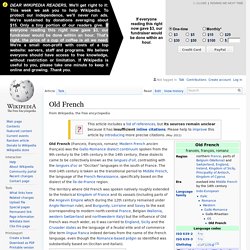
Occitan language. Occitan (English pronunciation: /ˈɒksɨtən, -tæn, -tɑːn/;[8][9] Occitan: [utsiˈta];[10] French: [ɔksitɑ̃]), also known as lenga d'òc (Occitan: [ˈleŋɡɔ ˈðɔ(k)]; French: langue d'oc) by its native speakers, is a Romance language.
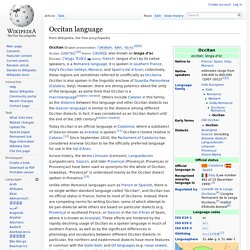
It is spoken in southern France, Italy's Occitan Valleys, Monaco, and Spain's Val d'Aran; collectively, these regions are sometimes referred to unofficially as Occitania. Occitan is also spoken in the linguistic enclave of Guardia Piemontese (Calabria, Italy). However, there are strong polemics about the unity of the language, as some think that Occitan is a macrolanguage[citation needed]. Provençal. From Wikipedia, the free encyclopedia Provençal may refer to:
